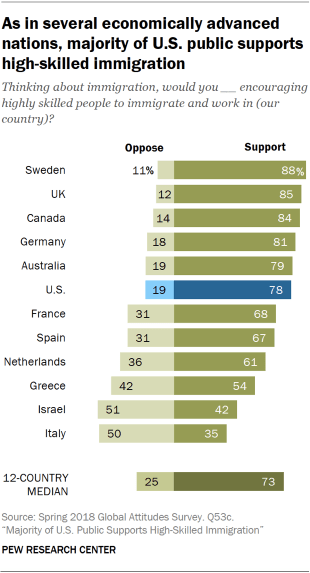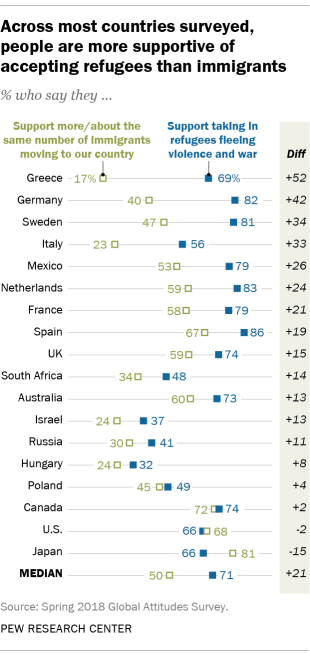Immigration policy is one of the most important areas of global development, as an open borders regime would dramatically reduce poverty and grow the world economy by up to 150%. Open Phil devotes some funding to immigration policy in the United States; however, the Trump Administration has been extremely hostile to immigration, and it seems wise to spread our effort across several countries in order to loosen immigration policy around the globe. Which countries would be the best places to advocate for more permissive immigration policy?
19
Reactions
2 Answers sorted by
According to a 2019 Pew Research Center survey of people in 12 countries, majorities of the public in Sweden (88%), the United Kingdom (85%), Canada (84%), Germany (81%), Australia (79%), and the United States (78%) support high-skilled immigration. Even among people who want fewer immigrants, support for high-skilled immigration in these countries is high.[1]
Additionally, people in many developed countries support admitting refugees even if they're not as keen on immigration in general.[2]
“Majority of U.S. Public Supports High-Skilled Immigration.” Pew Research Center, Washington, D.C. (2019). ↩︎
“People around the world express more support for taking in refugees than immigrants.” Pew Research Center, Washington, D.C. (2019). ↩︎
Interesting question! Before identifying countries in which to advocate, I think we'd need to
1. More precisely define what the goals are -> I'd infer from your post that you see poverty reduction as the main goal; other considerations could be to reduce suffering caused by family separation, exploitation of irregular migrants, or inequality, for example;
2. Identify the factors that we'd use to determine which countries would be the best places to advocate for more permissive immigration policy -> the importance, tractability, neglectedness framework is a useful starting point but would need to be fleshed out;
3. Use the above factors to assess which countries would be the best places in which to advocate for more permissive immigration policy;
4. Assess whether the impact of dedicating time and money to this cause outweighs the impact of putting the time and money into something else.
I don't have time right now to flesh out the analysis but would be very interested in hearing others' thoughts!
I don't have an answer to which countries would be more receptive to the idea, definitely don't try here in Israel!
I am however interested in the claimed effectiveness of open borders. Do these estimates take into account potential backlash or political instability that a large number of immigrants could cause? I understand that theoretically, closed borders are economically inefficient and solidify inequality, but I fear that open borders could cause significant political problems and backlash. Even if we were to consider this backlash to be unjustified or immoral, we need to keep it in consideration when thinking of the effects of this policy. Am I unjustified in thinking that significant negative political effects are possible?
I think these concerns are valid. The website Open Borders: The Case addresses many of the main arguments against open borders, including the possibility of nativist backlash to increased immigration.
"Nativist backlash" refers to the hypothesis that a country opening its borders to all immigration would cause a significant portion of current residents to subsequently turn against immigration. The problem with this claim is that the probability of backlash depends on how a country adopts open borders in the first place. Nathan Smith writes:
The trouble with “nativist backlash” as a standalone topic, is that a nativist backlash against open borders seems to presuppose that open borders is somehow established first. But for open borders to be established, something major would have to change in the policymaking process and/or public opinion. And whatever that change was, would presumably affect the likelihood and nature of any nativist backlash.
If open borders were established based on false advertising that it wasn’t really radical and wouldn’t make that much difference, then there would doubtless be a nativist backlash. Likewise if it were established by some sort of presidential and judicial fiat without popular buy-in. But if open borders came about because large majorities were persuaded that people have a natural right to migrate and it’s unjust to imprison them in the country of their birth, then people might be willing to accept the drastic consequences of their moral epiphanies.
So any claim that “open borders will inevitably provoke a nativist backlash” just seems ill formulated. One first needs a scenario by which open borders is established. Then one could assess the probability and likely character of a nativist backlash, but it would be different for every open borders scenario.


